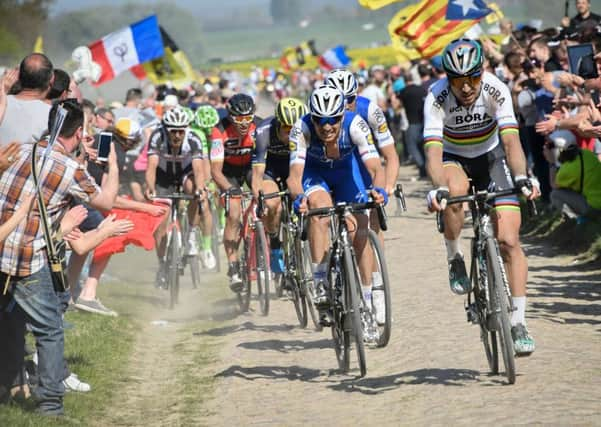Richard Moore: Peter Sagan is a throwback to cycling's golden era


The races that Sagan should be winning are the one-day Classics, in particular the big three in spring: Milan-San Remo, the Tour of Flanders and Paris-Roubaix, which is today. These are cycling’s “monuments” and Sagan, now 28, has only one, Flanders in 2016, on his palmarès. It’s a head scratcher.
I was trying to think of another athlete of whom you could say: he or she was the best in the world, and yet they consistently failed to win the big one. Names suggested included Colin Montgomerie, pictured, Richard Johnson, Jimmy White and Jelena Janković.
Advertisement
Hide AdAdvertisement
Hide AdWhat we usually say of cases like these is that there’s a failure to perform under the most extreme pressure, when the stakes are highest. We know what they can do, but they don’t seem able to do it when it most matters.
Sagan’s issue might be the opposite of that, since he seems completely unfazed by everything – including not winning: “I don’t care about victories, it’s more about the show,” he said last month.
So, yes, nonchalance might be the problem – if we are to believe that he doesn’t care about victories. Which, obviously, we don’t.
What might appear most surprising in the case of Sagan is that we are talking about events of more than six hours and 150 miles: tests of endurance and strength, surely, rather than nerve and skill. But the reality is that a road race tests all these things, with an added and important complication: it’s a team sport.
Paul Köchli, a famous coach of the 1980s, was adamant about this: “I hear people talk about ‘play sports’ and cycling as an ‘endurance sport.’ Ridiculous! Cycling is a play sport: it’s a game.”
For Köchli, it was as much a game as football, only more complicated. “In a football game, it’s very simple: two enemies against each other. A bicycle race is a strategic game with so many dimensions: 21 teams, 200 riders, wind, hills. You can be friends in a certain situation but maybe in ten minutes not friends any more.” Frequently, he added, “the enemy of my enemy is my friend”.
It is Sagan’s strength that, perversely, makes it so difficult for him to win. He’s the one around whom the others base their race. If he attacks, they follow. If someone else attacks, they look to him to chase. He is so dangerous – strong on climbs, lethal in sprints – that there is no scenario in which he can be a “friend”: he is always the enemy.
But there is a very specific problem this year: a team, Quick-Step, with several potential winners. It doesn’t matter that, individually, none is quite as good as Sagan: he isn’t racing against them as individuals. As Sagan said after finishing sixth at Flanders last Sunday: “They can play multiple cards.” With those multiple cards, they have won 24 races with ten different riders this season.
Advertisement
Hide AdAdvertisement
Hide AdSagan’s record in the world championship underlines the point. It is the only race of the year at which they race for their country rather than their professional team, and it’s rare that a collection of riders coming together for one race on one day perform with the same cohesion and unity as a professional team.
So to today’s Paris-Roubaix, the Queen of the Classics, and Sagan’s last chance of the spring to bag another monument. His record in a race that this year includes 29 sections of cobbles (or pavé), totalling 54km, isn’t great, but he’s the bookies’ favourite (he always is).
Also known as “The Hell of the North”, this is the race that’s spawned more myths and legends than any other, as well as a classic film, A Sunday in Hell, based on the 1976 edition. And the film about the race has even now spawned a new book, Sunday in Hell, by William Fotheringham.
These days, Paris-Roubaix, and the old roads it uses, are fetishised to such a degree that it’s tempting to think that the sport’s future might lie in its ancient history. It’s a serious trend: an increasing number of races are seeking out gravel or dirt roads, and the most keenly anticipated stage of this year’s Tour de France is stage nine, Arras-Roubaix, using some of the same sectors of pavé as the riders will tackle on Sunday: a mini-Paris-Roubaix, and on Bastille Day, no less.
One of the interesting things about reading Sunday in Hell is to realise just how close the race was to extinction as so many of the cobbles were lost to tarmac in the 1960s and 70s. Indeed, the mayors of rural French villages wanted big bike races like Paris-Roubaix precisely because it would give them the money to improve the roads. When one mayor was told that the whole point of Paris-Roubaix was to use the old pavé roads, he replied: “That’s all very well, but we have to drive down them the 365 days a year.”
A group of volunteers, Les Amis de Paris-Roubaix, now exists to help preserve the cobbles. That word, “cobbles”, incidentally, is misleading – think boulders scattered in mud rather than the smooth stones of Edinburgh’s New Town.
Thus, crashes, punctures and luck can dictate the outcome just as much as good form, sound tactics, even strong teams. Sagan punctured twice last year.
He would be a popular winner, because, like the race itself, Sagan is a bit of a throwback, a reminder of a golden era of cycling and cyclists: “Peter’s unique in today’s cycling,” as his Bora-Hansgrohe team-mate, Daniel Oss, said. “He races on instinct and passion. Of course, he is professional and he does the work. But he is a rider who can improvise and create magic in any race he starts.”
The question is, can he also win?